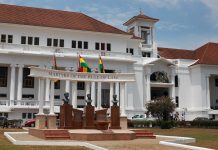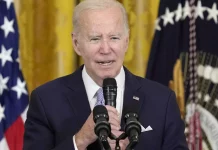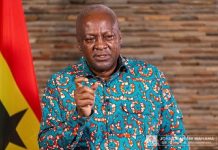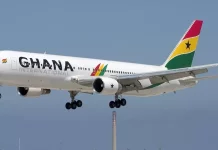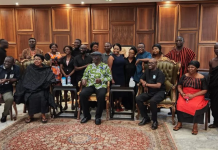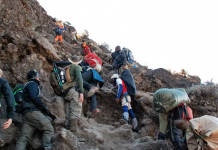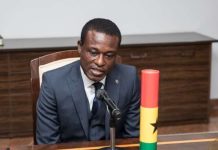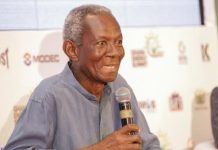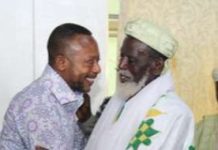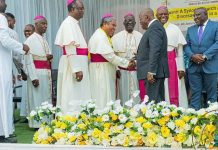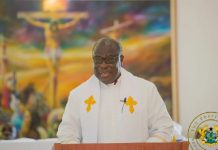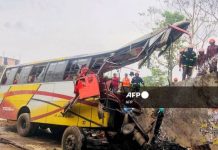Lying in bed in a Freetown hospital, Abu Bakar Bangura’s skin is barely visible under the bandages covering most of his badly burned body.
The 46-year-old – who was injured when a fuel tanker exploded after a collision with a truck on 5 November in Sierra Leone’s capital – is lucky to be alive. His wife burned to death.
The accident killed at least 148 people and injured dozens more, causing an outpouring of grief in the west African nation and sparking debate about poor road safety and the response from the authorities in a city that is no stranger to deadly disasters.
Chaos descended on that Friday night when a truck loaded with granite rammed into a petrol tanker in the eastern suburb of Wellington. Fuel spilled before igniting and the resulting explosion engulfed bystanders and vehicles at a busy junction – the main artery into and out of Freetown. The fire gave the night sky an ominous yellow glow.
Many of the victims were young men who had flocked to collect fuel leaking from the ruptured vehicle, others had simply been stuck in gridlock, like Bangura and his wife.
“My wife and I were returning home (by bus) when we got stuck in the traffic”, Bangura – the widowed father of two-year-old twins – told The Independent from his hospital bed.
He recalled how they decided to leave the bus and walk but got caught in the explosion.
“I heard a bang, a blast … we were running to escape,” he said. “I could not see my wife. I started praying, praying for her. She fell down … I knew she could not make it up.
“She died. She is a mother of twins. I feel this pain but … I trust in God.”
The morning after the disaster, the charred remains of dozens of vehicles and motorbikes hinted at the horror of the night before as police kept onlookers away from the scene.
On the other side of Freetown, at the central mortuary, hundreds of weeping mourners took turns identifying the bodies of their relatives. More than half of the dead were so badly burned that their loved ones could not recognise them. Days later, they were buried in a mass ceremony led by president Julius Maada Bio.
Mr Bio said that a task force would be established to investigate the tragedy, and make recommendations on how to avoid similar incidents in the future.
But public confidence in proper reform will be limited in a city accustomed to death.
In March this year, about 80 people were injured after a major fire in one of Freetown’s slums left more than 5,000 people displaced.
In 2017, at least 1,000 people were killed after heavy rains led to a mudslide down one of the mountains overlooking the city, leaving around 3,000 people homeless.
All of this in a country that is still recovering from the 2014-2016 Ebola outbreak – the deadliest on record – and a decade-long civil war that killed tens of thousands of people.
Politicians and analysts have described the latest disaster as avoidable, and pointed to the dysfunction of public institutions including the police.
One former firefighter – who spoke on condition of anonymity – said there would have been no deaths if the police had prevented people from gathering the spilled fuel and diverted traffic away from the area.
This view was echoed by Sidi Yahya Tunis, a spokesperson for the opposition All People’s Congress party. He said that Sierra Leone’s newly established disaster management agency – which was launched in 2020 – needed support and training.
“The response time of the police after the accident was grossly inadequate,” Tunis said.
The spokesperson for the Sierra Leone Police, assistant commissioner Brima Kamara, declined to comment, saying he did not want to prejudice the investigation ordered by President Bio.
“Road safety is also a big problem because the authorities allow all types of vehicles to ply on all sorts of roads. Besides, they don’t check their fitness or safety,” Tunis added.
Sierra Leone’s transport minister, Kabineh Kallon, did not disagree with this assessment, saying that there were road safety officials who “lacked integrity in the discharge of their duties”.
In an interview in his air-conditioned office, Kallon told The Independent he was doing everything he could to deal with the “lawlessness on the roads” by the end of the year, after meeting with the key players in the sector.
But rickety and potentially dangerous vehicles are still all over the place.
On the narrow roads of Freetown, motorbike taxis, tuk-tuks, cars, lorries, trucks, and trailers all compete for limited space. Pavements are almost non-existent. Where they do exist, the slabs are either broken or street traders have taken over.
Social commentator Karim Bah said that many of the trucks driving around Freetown were unfit for the road, but that road safety officials either did not bother to inspect the vehicles or accepted bribes to look the other way.
“It is a combination of personal and institutional failings that endangers the lives of people,” said Bah, who called for Freetown’s latest disaster to spur road safety reforms. “Road accidents cannot be completely avoided but their impact and frequency can be mitigated,”
Back at the hospital, Bangura could only agree as he contemplated life without his wife. “For the souls of those who died, let the authorities make our roads safer and let the response time to emergencies be shortened,” he said.
Source: Independent








